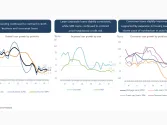
Innovative partnerships propel FWD’s health insurance growth in APAC
FWD’s new health unit, HealthyMe, aims to meet the region's growing healthcare demands amidst rising incomes.
Healthcare spending will be exponentially faster in the Asia Pacific (APAC) compared to other regions, bearing over 20% of the world’s total by 2030. With Asians’ investment in health increasing, costs are bound to go alongside it. Hence, insurers like FWD Group adapted by establishing a new unit dedicated to this market.
Dr. Sarah Salvilla, Group Chief Health Officer at FWD Group, spoke to Insurance Asia about their pioneering initiative, FWD HealthyMe, and its impact on the market. Over the past decade, FWD has established itself in life insurance across 10 Asian markets, serving more than 13 million customers.
“Building on our achievements, we are applying the same ethos of changing the way people feel about insurance to the accident and health space. We recognise the pressing challenges we see in this segment — such as a shortfall of healthcare workers, ageing populations, and the rise of medical inflation,” Salvilla said.
Healthcare benefit costs in APAC are expected to remain around 9.9% in 2024, similar to 2023, according to a survey by insurance company Willis Towers Watson (WTW). The Global Medical Trends Survey indicates that nearly 59% of insurers in APAC foresee higher increases over the next three years.
In 2022, the average cost of medical care in APAC rose by 7.2%. Whilst the 2023 forecast for APAC is lower than the global average of 10.7%, both global and APAC projections for 2024 are at 9.9%.
“Global inflation, which was a significant factor in driving up healthcare costs, has moderated in 2023 and is expected to continue to fall going into 2024. Whilst cost increases are projected to ease in 2024, they remain largely elevated in most markets in APAC, including the Philippines, Malaysia, India, Indonesia, South Korea, Singapore, and Vietnam,” said Eva Liu, Head of Strategic Development, Health and Benefits in Asia Pacific at WTW.
“The overuse or misuse of care due to medical practitioners recommending too many services and the high cost of new medical technologies, ranging from artificial intelligence-powered diagnostic tools to gene therapy, remain the leading external factors driving the persistent high trend,” Liu said in a press release.
The primary drivers of medical costs in the region are the overuse of care (72%) due to excessive services or prescriptions by medical professionals, and poor health habits amongst insured members (50%).
Cardiovascular diseases and cancer are the fastest-growing conditions in APAC by incidence of claims and costs. Globally, mental and behavioural health disorders are amongst the fastest-growing conditions, but APAC often excludes these from coverage, despite the need.
“This could be due to the sociocultural stigmas around mental health that exist in many countries, including in Singapore, and coverage exclusions which may be in place. However, these exclusions can significantly affect employee well-being and Diversity, Equity & Inclusion (DEI) efforts. Generally, insurers or even employers here still lag behind global players in making changes to medical portfolios in 2023, from wellbeing services or adding other DEI features in their programmes,” Audrey Tan, Head of Health & Benefits in Singapore at WTW, said in the same press release.
“Faced with the prospect of higher cost increases over the next several years, employers need to focus their efforts on how to make their healthcare benefit programmes more cost-effective. This can range from conducting a review to determine if coverage is the right fit for their organisations to formulating a wellbeing strategy and ensuring wellbeing benefits are accessible to all employees. By understanding the factors that affect healthcare and drive costs in their populations, insurers and employers can develop strategies to combat the ever-present threat of rising costs in Singapore,” added Tan.
HealthyMe
Back on 6 May, FWD announced the launch of its HealthyMe businesses, which “aims to be a partner to customers across Asia for their lifelong health needs, utilising the latest developments in health technology and research to provide diagnostic services alongside comprehensive accident and health insurance.”
Through this, FWD stated that the business is not just about providing coverage, but it’s about “developing evidence-based, innovative partnerships with healthcare providers and industry leaders that build on the strong foundations provided by FWD’s existing suite of life insurance, critical illness, and medical offerings.”
Salvilla also cited their partnership with the Chinese University of Hong Kong (CUHK) on automatic retinal image analysis to detect risks like major depressive disorder, a groundbreaking initiative that spans Hong Kong and Malaysia.
“FWD HealthyMe is all about developing evidence-based, innovative partnerships with healthcare providers and industry leaders that build on the strong foundations provided by FWD’s existing suite of life insurance, critical illness and medical offerings,” Salvilla said.
She also boasts that success isn't just about technological innovation.
“We will look at a range of factors, but I always believe that the true measure of success and progress will be not in the health technology, but in how its application improves patient outcome, quality of life, and healthspan,” Salvilla told Insurance Asia.
Outlook
The world’s health and medical insurance industry is projected to grow significantly, driven by factors such as the COVID-19 pandemic, the Ukraine-Russia war, and the increasing prevalence of diseases linked to sedentary lifestyles.
The overall sector is bound to see a compound annual growth rate (CAGR) of 8.9% from 2023 to 2028, reaching $3.4 trillion, revealed a BCC Research Report.
Mirroring this projection for the region, FWD’s Salvilla sees “rising incomes, greater awareness of health and demand for increased protection against unforeseen medical and financial challenges” as major growth drivers for APAC.
“However, there are challenges that need to be addressed, including an expected shortfall of healthcare workers, ageing populations which bring a greater risk of chronic diseases and the rise of medical inflation,” Salvilla cautioned.
“Against this backdrop, advancements in technology, precision medicine, research and health awareness present a unique opportunity for a customer-focused and digitally enabled company like FWD to be a proactive health partner to customers,” she added.
Rising trends such as diagnostics, precision medicine and the shifting focus to a well-care model in healthcare are deemed positive outliers which FWD is keen to tap into. “FWD will remain steadfast in our commitment to providing the human touch in insurance, whilst embracing the transformative power of technology and innovation,” said Salvilla.


















 Advertise
Advertise









